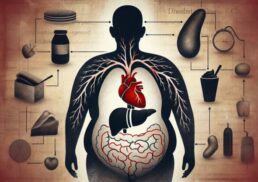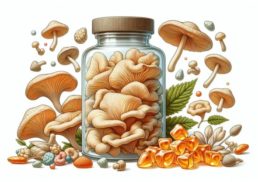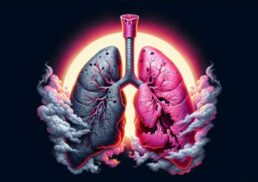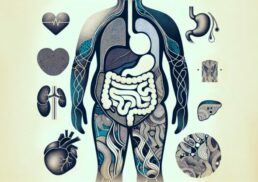Did you know that riboflavin, also known as vitamin B2, is an essential nutrient that plays a crucial role in your daily life? In this blog post, we will delve into the world of riboflavin and answer the question, “What is riboflavin?” We will reveal its importance in energy production, cellular growth, and metabolism. Get ready to discover how this vital nutrient affects your overall health and well-being!
Table of Contents
Key Takeaways
Riboflavin is an essential B vitamin that plays a key role in energy production, cellular growth and metabolism.
Early recognition and treatment of riboflavin deficiency is essential for optimal health, with food sources such as eggs, organ meats and dairy products providing adequate intake levels.
Riboflavin has been linked to the prevention of various health conditions. Consulting a healthcare provider before supplementation is recommended to ensure safety.
Understanding Riboflavin
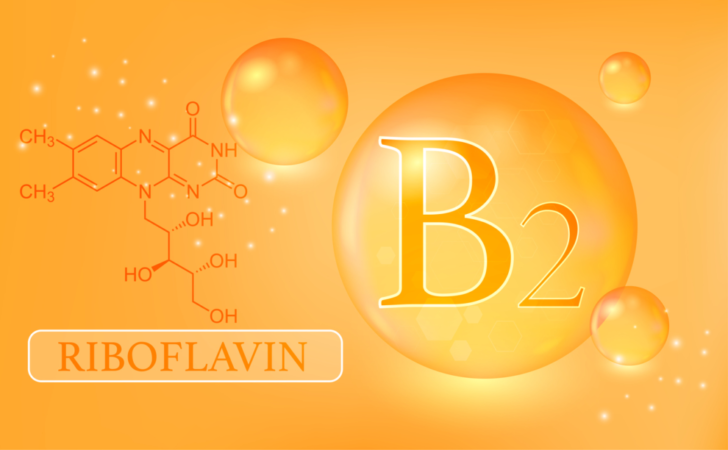
Riboflavin, also known as vitamin B2, plays a crucial role in our bodies’ proper functioning as one of the essential B vitamins. It is involved in various processes, such as energy production, cellular growth, and metabolism of fats, steroids, and medications. Inadequate riboflavin intake can lead to deficiency, which manifests in skin disorders, swollen lips, reproductive issues, and damage to the liver and nervous system.
Milk is commonly packaged in cartons or opaque plastic containers to prevent light from deactivating riboflavin, as recommended by the Food and Nutrition Board. The body does not store riboflavin, and excess amounts are excreted in urine, highlighting the importance of consistent dietary intake.
The Two Coenzymes
Riboflavin is a component of two important coenzymes – flavin adenine dinucleotide (FAD) and flavin mononucleotide (FMN). These coenzymes play a crucial role in the body, alongside other essential nutrients like pantothenic acid. These coenzymes play integral roles in a multitude of physiological processes, including energy production, metabolism, and cell signaling. Some studies have even explored the use of high-dose riboflavin in the treatment of specific conditions.
FAD and FMN, being involved in numerous vital bodily functions, carry great significance. Maintaining an adequate intake of riboflavin is crucial in maintaining optimal health and avoiding deficiency-related problems.
Riboflavin Dietary Recommendations
The Recommended Dietary Allowance (RDA), a part of dietary reference intakes, provides guidelines on the daily intake of riboflavin for various age groups, sexes, and life stages, including pregnancy and lactation. Here are the recommended daily intake amounts.
Adult females: 1.1 mg
Lactating mothers: 1.6 mg
Children aged 6-11: 1.9 mg
Adolescents aged 12-19: 2.3 mg
Approximately 6% or less of the US population has an intake of riboflavin lower than the Estimated Average Requirement (EAR). Before taking riboflavin supplements, it is advisable to consult a healthcare provider to check your riboflavin status and determine if supplementation is necessary.
Riboflavin is considered safe for most children when consumed in amounts commonly found in foods, and higher intakes of 100-200 mg daily have been safely used.
Identifying Riboflavin Deficiency
Although it is relatively rare, riboflavin deficiency can have serious consequences on one’s health. Clinical manifestations include skin disorders, swollen lips, reproductive issues, and damage to the liver and nervous system. Other indications can range from a pale complexion, painful fissures in the mouth and lips, exhaustion, retarded growth, digestive difficulties, a swollen magenta-colored tongue, ocular issues, skin eruptions, anemia, hair loss, and itchy red eyes.
Recognizing the signs of riboflavin deficiency and taking appropriate corrective measures is vital. Promotion of overall health and prevention of these issues can be achieved by ensuring an adequate intake of riboflavin through diet or supplementation.
Foods Rich in Riboflavin
A variety of food sources contain riboflavin, making it easy to incorporate this essential nutrient into your diet. Some examples include:
Eggs
Organ meats (kidneys and liver)
Lean meats
Milk
Certain vegetables
Additionally, grains and cereals in the United States and many other countries are fortified with riboflavin, as mentioned in a study published in J Clin Nutr.
Meat, fish, fowl, eggs, dairy products, green vegetables, mushrooms and almonds are all natural sources of riboflavin. With a variety of food items containing this nutrient, supplementing one’s diet becomes easy. Major dietary contributors of riboflavin in the US include milk and milk drinks, bread and bread products, mixed foods with meat or grain as the main ingredient, and ready-to-eat cereals.
Take note, cooking methods can affect the riboflavin content in foods. Due to its solubility in water, boiling can result in a greater loss of riboflavin compared to other methods, such as steaming or microwaving. To maximize riboflavin intake, consider incorporating a variety of these food sources into a balanced diet.
Riboflavin Supplementation
While obtaining riboflavin through a balanced diet is generally recommended, dietary supplements, such as riboflavin supplementation, can be beneficial for certain individuals. Riboflavin supplementation offers multiple advantages, such as:
increasing glucose uptake
promoting cellular functions
sustaining healthy blood cells
acting as an antioxidant
However, there are potential risks associated with riboflavin supplementation. Side effects may include nausea, vomiting, and diarrhea, and riboflavin can interact with certain medications. Before taking a riboflavin supplement, consulting a healthcare provider is important to assess your riboflavin status and determine if supplementation is necessary.
The RDA for riboflavin is 1.3 mg for adult men and 1.1 mg for adult women. However, the dosage may be adjusted based on individual requirements. To ensure adequate riboflavin intake, consider incorporating the following into your diet:
Dairy products
Eggs
Fortified cereals
Green leafy vegetables
Interactions and Absorption
Although no clinically relevant interactions have been documented between riboflavin and medications, it is suggested that riboflavin might reduce the absorption of tetracyclines in the body. As always, consult your healthcare provider before taking any supplement, especially if you are on medication.
Factors affecting riboflavin absorption include liver disease, which is associated with decreased riboflavin absorption. Individuals with liver disease or other medical conditions that may affect riboflavin absorption should work closely with their healthcare provider to ensure adequate riboflavin intake.
Special Populations at Risk
Certain populations may be at a higher risk of riboflavin inadequacy, such as:
Individuals adhering to a vegan diet or consuming minimal dairy products in developed nations
Those with developmental abnormalities
Athletes and those with high physical activity
The elderly
Alcoholics
Those with riboflavin transporter deficiency due to genetic mutations.
Populations at risk should consume riboflavin-rich foods such as:
Dairy products
Eggs
Fortified cereals
Green leafy vegetables
They may also require a riboflavin supplement. Seeking guidance from a healthcare provider can help ensure adequate riboflavin intake and prevent deficiency-related issues.
Riboflavin and Health Conditions
Research has linked riboflavin to the prevention and treatment of various health conditions. For instance, riboflavin has been shown to be effective in reducing oxidative stress and inflammation of nerves associated with migraine headaches. Riboflavin also plays a crucial role in modulating circulating levels of homocysteine, an amino acid derived from animal protein sources such as meat, which is a risk factor for cardiovascular disease (CVD).
Long-term riboflavin deficiency has been associated with the development of brain and heart disorders, as well as certain types of cancer in animal studies. Individuals can potentially reduce the risk of these health issues and promote overall well-being by ensuring adequate riboflavin intake.
Riboflavin Safety and Toxicity
High riboflavin intake is unlikely to cause toxicity, and no upper intake level has been established due to its low risk of adverse effects. Potential side effects of riboflavin include bright yellow urine and nausea. However, these side effects are generally mild and do not pose significant harm to one’s health.
Consulting a healthcare provider to assess your riboflavin status and determine the appropriate dosage is important when considering riboflavin supplementation. Individuals can promote overall health and well-being by maintaining an adequate riboflavin intake through a balanced diet or supplementation.
For more info, please visit RIBOFLAVIN – Uses, Side Effects, and More.
Riboflavin in the Context of a Healthy Diet
Meeting nutritional needs and promoting overall health requires consuming riboflavin as part of a healthy, balanced diet. Riboflavin is a vital nutrient that plays a role in:
Energy production
Metabolism
Formation of red blood cells
Maintaining healthy skin, eyes, and nervous system
The suggested dietary allowance (RDA) for dietary riboflavin is 1.1-1.3 mg/day for adults. Ensuring adequate intake of dietary riboflavin can be achieved by incorporating riboflavin-rich foods into your diet, such as:
Dairy products
Eggs
Fortified cereals
Green leafy vegetables
Research has indicated that riboflavin may be beneficial for energy levels, cognitive function, and the reduction of certain diseases.
Summary
In conclusion, riboflavin is an essential nutrient that plays a vital role in energy production, cellular growth, and metabolism. Ensuring an adequate intake of riboflavin through a balanced diet or supplementation can help prevent deficiency-related issues and promote overall health. By understanding the importance of riboflavin, incorporating it into your diet, and being aware of potential interactions and risks, you can take charge of your health and well-being.
So, the next time you enjoy a glass of milk, a bowl of fortified cereal, or a leafy green salad, remember the crucial role of riboflavin in your body and the benefits it provides. Here’s to a healthy, riboflavin-rich life!
Frequently Asked Questions
What does riboflavin do for your body?
Riboflavin, also known as Vitamin B2, helps the body convert food into energy, metabolize fats and proteins, and is one of the 8 B vitamins.
It is found in many foods, including dairy products, eggs, green vegetables, lean meats, and fortified cereals. It is also available as a dietary supplement.
Riboflavin is important for healthy skin, eyes, and nervous system. It also helps.
Is vitamin B12 the same as riboflavin?
No, vitamin B12 and riboflavin are two distinct vitamins in the B vitamin group.
Vitamin B2, or riboflavin, is essential for other vitamins to perform their task and helps with migraines and headaches.
Vitamin B12 helps maintain healthy nerve cells and red blood cells.
Who shouldn t take riboflavin?
Those with an allergy or reaction to B vitamins, pregnant women, and those who are breastfeeding should not take riboflavin.
What is riboflavin?
Riboflavin, also known as vitamin B2, is an essential nutrient that plays a role in energy production, cellular growth and metabolism.
It is found in a variety of foods, including dairy products, eggs, green vegetables, lean meats, and fortified cereals. Riboflavin is also available as a dietary supplement.
Riboflavin is important for your health.
What are the signs of riboflavin deficiency?
Riboflavin deficiency can manifest in the form of skin disorders, swollen lips, reproductive issues, and liver and nervous system damage.
